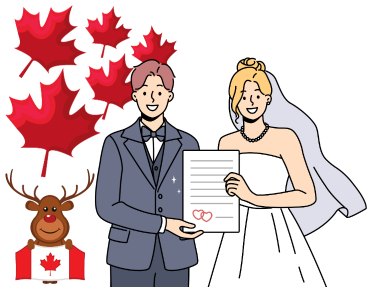Marriage is a significant milestone in one’s life, and it comes with a lot of responsibilities and legal requirements. If you are planning to get married or have already tied the knot in Nova Scotia, you may be wondering about the legal aspects of your union, including the need for a marriage certificate. In this article, we will provide you with everything you need to know about marriage certificates in Nova Scotia. From understanding the legal requirements for marriage to applying for a certificate and replacing lost or damaged ones, we have got you covered. So, whether you are a newlywed or planning to get married soon, keep reading to learn more about marriage certificates in Nova Scotia.
Why Do You Need a Marriage Certificate?
A marriage certificate is an essential document that provides proof of a legal union between two individuals. It serves as evidence of a couple’s marriage and can be used for various purposes. One of the main reasons you need a marriage certificate is to change your last name legally. After getting married, many women choose to take their spouse’s last name, and a marriage certificate is required to do so. Additionally, a marriage certificate is necessary when applying for joint bank accounts, insurance policies, and other financial benefits that come with being married. In some cases, a marriage certificate may also be required when applying for a mortgage or a loan. Furthermore, if you plan on travelling abroad with your spouse, you may need to present your marriage certificate as proof of your relationship. In the event of a divorce, a marriage certificate can serve as evidence in court proceedings and can help determine property division and child custody arrangements. Therefore, it is crucial to keep your marriage certificate safe and secure at all times. Overall, a marriage certificate is an essential document that provides numerous benefits and serves as evidence of your legal union with your partner.
Understanding the Legal Requirements for Marriage in Nova Scotia
Before getting married in Nova Scotia, it is important to understand the legal requirements. The minimum age to get married in Nova Scotia is 19 years old. However, if you are 16 or 17 years old, you can still get married with parental consent. If you are under 16 years old, you will need a court order and parental consent. In addition, both parties must not be currently married or in a registered domestic partnership. Same-sex marriage has been legal in Nova Scotia since 2004.
There are also certain documents that must be presented before getting married in Nova Scotia. Both parties must provide a valid government-issued photo ID such as a passport or driver’s license. If either party has been previously married, they must provide a final divorce decree or a death certificate of their previous spouse. If the documents are not in English, they must be translated by a certified translator.
Furthermore, couples must apply for a marriage license at least five business days before the wedding ceremony. This can be done online or in person at a Service Nova Scotia Centre. The marriage license is valid for three months from the date of issue.
It is important to note that if one of the parties is not able to physically attend the marriage ceremony due to illness or other circumstances, they may still be able to participate through video conferencing. However, this requires special permission from the Vital Statistics office.
Understanding these legal requirements for marriage in Nova Scotia can help ensure a smooth and hassle-free wedding day.
Applying for a Marriage Certificate in Nova Scotia
Applying for a marriage certificate in Nova Scotia is a straightforward process. To begin with, the application can be completed online through the Vital Statistics website or by mail. It’s important to note that only the bride or groom, a parent, or a legal guardian can apply for a marriage certificate. The applicant must provide basic information such as the full names of both parties, the date and location of the marriage, and any relevant identification numbers. If the marriage occurred outside of Nova Scotia, additional documentation may be required. It’s also important to ensure that all information provided is accurate as any errors could result in delays or rejections of the application. Once the application is received and processed, the certificate will be mailed to the address provided within two to four weeks. Alternatively, applicants can choose to pick up their certificate in person at the Vital Statistics office in Halifax. The cost for a marriage certificate in Nova Scotia is $32.60 plus any additional fees for rush processing or delivery options. Overall, applying for a marriage certificate in Nova Scotia is a relatively simple process that can be done from the comfort of your own home.
Processing Time and Fees for Marriage Certificates
When applying for a marriage certificate in Nova Scotia, it is important to consider the processing time and fees. The processing time for a marriage certificate in Nova Scotia is typically 15 business days from the date of receipt of the application. However, this can vary depending on factors such as the volume of applications being processed at the time of submission and any errors or omissions in the application that require additional review. To expedite the processing time, applicants can choose to pay an additional fee for priority service, which guarantees that their application will be processed within 5 business days.
In terms of fees, the cost for a marriage certificate in Nova Scotia is currently $32.60. This fee includes one copy of the certificate, but additional copies can be ordered for an extra fee. It is important to note that fees are subject to change without notice, so it is recommended to check with the vital statistics agency for up-to-date pricing information before submitting an application.
Payment for marriage certificates can be made by credit card, money order or cheque. It is important to ensure that payment is included with the application, as incomplete applications or applications without payment will not be processed.
Overall, while the processing time and fees for marriage certificates in Nova Scotia may seem daunting, they are a necessary part of the legal process of getting married. By understanding these requirements and planning accordingly, couples can ensure a smooth and hassle-free application process.
Replacing a Lost or Damaged Marriage Certificate in Nova Scotia
Replacing a lost or damaged marriage certificate in Nova Scotia is a straightforward process that can be done either online or by mail. To replace a lost or damaged certificate, applicants need to complete the Marriage Certificate Application Form and indicate that they are requesting a replacement. They also need to provide their personal information, such as their full name, date of birth, and the date and place of their marriage. In addition, they must provide proof of identity and residency, such as a driver’s license or passport. If the applicant is not the person named on the certificate, they must provide documentation proving their relationship to the person named on the certificate, such as a birth certificate or a legal document.
The fee for replacing a lost or damaged marriage certificate in Nova Scotia is $32.00. This fee includes one copy of the replacement certificate. Additional copies can be ordered at an additional cost. The processing time for replacement certificates is typically 4-6 weeks.
It is important to note that if the original certificate was lost due to theft, the applicant must provide a police report documenting the theft. If the original certificate was destroyed due to fire or other natural disasters, the applicant must provide documentation proving this.
Overall, replacing a lost or damaged marriage certificate in Nova Scotia is a relatively simple process as long as applicants have all the required documentation and pay the necessary fees.
Marriage Certificates from Other Provinces and Countries
If you are planning to get married in Nova Scotia, but one or both of you are from another province or country, you may need to obtain a marriage certificate from that location. This is especially important if you plan to change your last name or apply for spousal benefits. Each province and country has its own rules and requirements for obtaining a marriage certificate, so it is essential to research the specific requirements before applying. In some cases, you may need to provide additional documentation, such as a passport or birth certificate, to prove your identity and eligibility for marriage. It’s also important to note that not all countries recognize marriages performed in other countries, so it’s crucial to check with your home country’s government for any necessary legal steps to validate your marriage. When applying for a marriage certificate from another province or country, it’s recommended to do so as early as possible, as processing times can vary significantly. You may also need to pay additional fees for expedited processing or international shipping. Overall, obtaining a marriage certificate from another province or country can be a complex process, but with proper research and preparation, you can ensure a smooth and hassle-free application.
Tips for a Smooth and Hassle-Free Marriage Certificate Application
To ensure a smooth and hassle-free application for your marriage certificate in Nova Scotia, there are some tips you should keep in mind. Firstly, make sure you have all the required documents ready before starting the application process. This includes valid identification, proof of divorce (if applicable), and payment information. It’s also important to double-check that all the information provided is accurate and matches the details on your identification documents.
Secondly, it’s recommended to apply for your marriage certificate well in advance of when you need it. Processing times can vary, so giving yourself enough time will prevent any unnecessary stress or delays. Additionally, if you’re unsure about any part of the application process or have any questions, don’t hesitate to reach out to the Vital Statistics office for assistance.
Thirdly, if you’re applying for a marriage certificate from another province or country, make sure to research the specific requirements and procedures for that location. Each jurisdiction may have different rules and processing times.
Finally, consider using an online service to submit your application. This can save time and effort by allowing you to complete the process from the comfort of your own home. However, be sure to choose a reputable service that follows proper security measures to protect your personal information.
By following these tips, you can ensure a smooth and hassle-free application process for your marriage certificate in Nova Scotia.
After delving into the topic of marriage certificates in Nova Scotia, it is clear that obtaining this legal document is crucial for a variety of reasons. From proving marital status for immigration purposes to accessing spousal benefits, a marriage certificate serves as an official record of a union. However, navigating the process of applying for and replacing a marriage certificate can be complex and time-consuming. By understanding the legal requirements and processing times, individuals can ensure a smooth and hassle-free application experience. It is also important to note that marriage certificates from other provinces and countries may require additional steps for recognition in Nova Scotia. As society continues to evolve, it is worth reflecting on the significance of this legal document and how it impacts individuals’ lives.






Leave a Reply